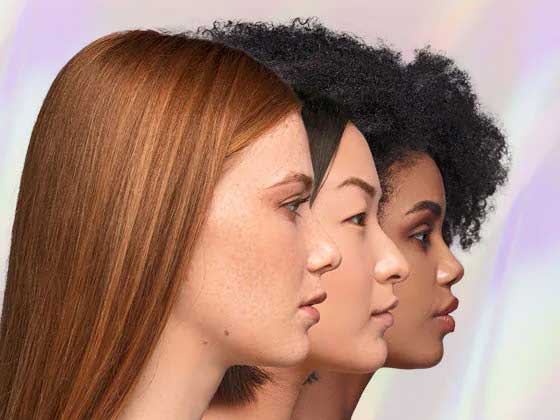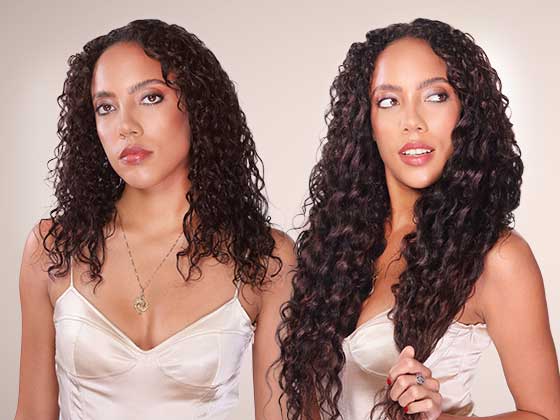Uncomfortable, embarrassing, and at times even painful – dealing with persistent dry scalp can be a real challenge. If you find yourself constantly scratching your head, battling with flakes, and feeling frustrated with your hair's lackluster appearance, it's time to take action. Below is a collection of tried-and-tested methods that will help you combat dry scalp and achieve a nourished, itch-free head of hair.

What Causes Dry Scalp?
Dry scalp can be caused by a combination of internal and external factors. Understanding these causes is crucial in effectively addressing and preventing the condition. Here's a breakdown of both internal and external factors that contribute to dry scalp:
Genetics
The genes you inherit from your parents can influence how much natural oil, or sebum, your scalp produces and how effectively it retains moisture. Sebum is essential for maintaining a healthy scalp as it helps to lubricate and protect the skin, including the scalp, from external factors and dehydration.
Hormonal Changes
Hormonal fluctuations can have a significant effect on various aspects of our body's physiology, and this includes the scalp’s health. During periods of hormonal changes, such as puberty, pregnancy, and menopause, the balance of hormones in the body shifts. This can directly influence the activity of the sebaceous glands and, consequently, the production of sebum on the scalp.
Weather
Extreme weather conditions can affect the health and hydration of the scalp. Whether it's the cold, dry air of winter or the hot, arid climate of certain regions, these environmental factors can strip the scalp of its natural moisture, leading to dryness, flakiness, and discomfort.
Hair Products
Overusing harsh hair products and subjecting your hair to excessive hairstyling practices can have detrimental effects on your scalp's health and lead to dryness. Shampoos with sulfates, for one, can be too effective at stripping away natural oils from the scalp. This can leave the scalp dry, itchy, and prone to flakiness.
Stress
Chronic stress affects both physical and mental health, and the skin, including the scalp, is not exempted. When stress becomes chronic or ongoing, it can disrupt the body's natural balance, leading to a range of health issues, including those affecting the skin and scalp.

Dry Scalp vs. Dandruff: What's the Difference?
Dry scalp occurs when the skin lacks moisture, often due to inadequate sebum production. Symptoms include itchiness and smaller, powdery flakes. External factors like cold weather and harsh products contribute, along with dehydration and poor nutrition.
Dandruff is caused by an overgrowth of Malassezia fungus, leading to oily, larger flakes, redness, and itching. It's triggered by factors like oily skin, stress, and medical conditions. Anti-dandruff shampoos with zinc pyrithione, ketoconazole, or salicylic acid help control it.

It's important to differentiate between these conditions accurately to make sure you are getting the appropriate treatment. If you're uncertain about your scalp condition, it's best to consult a dermatologist or a healthcare professional who can provide a proper diagnosis and recommend suitable treatments tailored to your specific scalp needs.
How To Get Rid of Dry Scalp, For Good
The treatment for dry scalp varies depending on the underlying cause of the condition. But commonly, it involves a combination of external care and lifestyle adjustments to restore moisture and improve scalp health. Below are some effective methods to treat dry scalp:
Moisturizing with Coconut Oil
Coconut oil has gained immense popularity in the beauty and skincare industry, particularly for its exceptional moisturizing properties. To use it, warm some coconut oil and massage it into your scalp. Leave it on for about 30 minutes before washing your hair. This will help nourish and hydrate your scalp.

Using Aloe Vera
Aloe vera gel is a natural remedy known for its soothing and moisturizing properties, making it an excellent choice for addressing various skin and scalp issues. The gel is derived from the leaves of the Aloe vera plant, which is renowned for its healing properties. To soothe dry scalp, apply fresh aloe vera gel directly and let it sit for 15-20 minutes before rinsing it off.

Applying Tea Tree Oil
Tea tree oil has antifungal properties and can help combat dryness caused by fungal infections. Start by mixing a few drops of tea tree oil with a carrier oil (e.g., coconut oil or olive oil) and apply it to your scalp. Leave it on for 15-30 minutes before shampooing.
Exfoliating with Baking Soda
Baking soda can help remove dead skin cells and product buildup that might be contributing to dryness. Start by mixing some baking soda with water to form a paste, and gently massage it into your scalp.

Use a Humidifier
If you live in a dry climate or during winter months when indoor heating reduces humidity, use a humidifier to add moisture to the air and prevent scalp dryness.
Are there home remedies for dry scalp?
Yes, there are several home remedies that can help provide relief from itchiness, flakiness, and irritation. Below are some home remedies you can try to soothe your dry scalp:
Olive Oil
Olive oil is rich in antioxidants and natural emollients that can help moisturize the scalp. Warm some olive oil and apply it to your scalp. Leave it on for 30 minutes before washing your hair.
Apple Cider Vinegar
Apple cider vinegar has antimicrobial properties that can help balance the scalp's pH and reduce itchiness. Treat dry scalp by mixing equal parts of apple cider vinegar and water, and apply the solution to your scalp after shampooing. Rinse it out thoroughly.

Yogurt and Banana Hair Mask
Create a nourishing hair mask by blending yogurt and ripe bananas together. Apply the mask to your scalp and hair, and leave it on for 30 minutes before rinsing it off.
Coconut Milk
Coconut milk is packed with essential fats and nutrients that can hydrate and moisturize the scalp. Apply fresh coconut milk to your scalp and leave it on for 20-30 minutes before washing your hair.
Aloe Vera and Honey
Mix aloe vera gel with honey to create a soothing scalp treatment. Apply the mixture to your scalp and let it sit for 15-20 minutes before rinsing.
Essential Oil Blend
Some essential oils are known for their scalp-nourishing properties. These include lavender, tea tree, and rosemary essential oils. Mix a few drops of these with carrier oil, such as coconut oil or jojoba oil. Massage the mixture into your scalp, leave it on for 30 minutes, and then wash your hair.
People Also Ask
Why does my scalp hurt?
Scalp pain or tenderness can be caused by various factors. One common reason is wearing tight hairstyles that strain the scalp, such as ponytails or braids. Additionally, excessive sun exposure without protection can lead to sunburn on the scalp, causing pain and sensitivity.
Skin conditions like seborrheic dermatitis or contact dermatitis can cause inflammation and discomfort on the scalp. Infections, such as folliculitis or fungal infections, can also result in scalp pain. Injuries like cuts, bruises, or head trauma can also be a source of discomfort.
What can scalp dryness be a symptom of?
Scalp dryness can manifest as a symptom of various factors and conditions. During colder months, reduced humidity and indoor heating can lead to dryness on the scalp. Overwashing the hair also strip the scalp of its natural oils, resulting in dryness.
Hair care products with harsh chemicals or alcohol can also contribute to scalp dryness and irritation. Common scalp conditions like seborrheic dermatitis and psoriasis can cause dry, flaky, and itchy scalp patches.
Conditions like scalp eczema and fungal infections may also lead to dryness and discomfort. Allergic reactions to hair products or environmental triggers can be another cause of dryness on the scalp. In some cases, underlying medical conditions such as hypothyroidism or Sjögren's syndrome can present with dryness on the scalp.
When do I need to consult a doctor about my dry scalp?
While mild scalp dryness can often be managed with home remedies, seeking medical attention is essential in specific situations. If the dryness persists despite trying home treatments for an extended period, it's advisable to consult a doctor. Additionally, if the dryness is accompanied by severe itching, pain, or tenderness, a professional evaluation is necessary to identify the root cause. Any visible scalp changes, such as redness, flakiness, or unusual patches, should be brought to the attention of a healthcare provider.
Significant hair loss along with dryness on the scalp requires a medical assessment to determine the underlying issue. In more severe cases where the dryness leads to open sores, bleeding, or oozing on the scalp, immediate medical attention is necessary.
If the dryness spreads to other parts of the body or becomes more widespread, a doctor's evaluation is crucial. The same is true if there is a fever or signs of infection around the affected area. A healthcare professional can conduct a thorough examination, diagnose the underlying cause of the dry scalp, and provide the best treatment based on the specific condition or issue.
How Do Your Nurture Your Scalp with Hair Extensions?
In our pursuit of healthier, more vibrant hair, it's crucial to recognize the significance of a nourished scalp as the cornerstone of your journey.
As we embrace the versatility and charm that hair extensions offer, it's important to remember that caring for your scalp is equally essential. A nourished scalp not only ensures that your extensions seamlessly blend with your natural hair but also maintains the overall health and radiance of your locks.
Simple steps, such as adopting a gentle cleansing routine for your scalp, ensuring regular hydration with hair care products, and selecting hair extensions that align with your hair type, can make a world of difference. This journey of self-care and expression aligns beautifully with the vision of celebrating diversity and authenticity. Just as each strand of hair is unique, so is the journey we take towards self-discovery.















